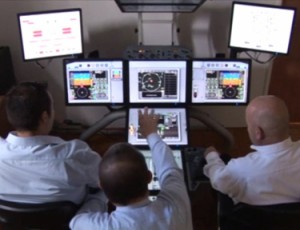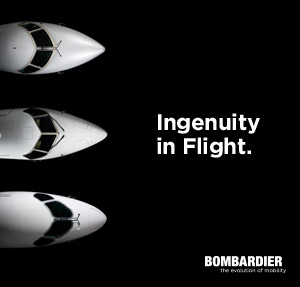CAE Dassault Falcon Maintenance Training Program in Bordeaux Completes 2nd Year
January 17, 2012
�
�
�
�
�
�
�
�
�
�
�
�
�
�
A CAE Simfinity integrated procedures trainer (IPT) enables a cockpit-like experience for Dassault Falcon maintenance students.
16/01/2012
A Falcon maintenance technician training program which blends CAE simulation-based theoretical instruction with the option for practical aircraft experience at Dassault’s factory is completing its second year in Bordeaux, France.
The EASA approved four to five week B1/B2 training program began in January 2010 and has trained more than 200 Falcon 7X, Falcon 900EX EASy and Falcon 2000EX EASy technicians from around the world for Falcon operators, the Dassault front-line Customer Service Team and maintenance, repair and overhaul (MRO) facilities.
In addition to instructors with more than 25 years average experience, the theoretical program features CAE SimfinityTM simulation-based multi-screen classrooms, 360-degree virtual tours of the cockpit, aircraft cabin and service bays, a CAE Simfinity Integrated Procedures Trainer, and visits to the Dassault factory to visualize aircraft during early production stages and near final certification. Timed to coordinate with the CAE training schedule, Dassault Aviation also offers a two week follow-on EASA approved practical training course leading to a type-rating maintenance certification.
CAE has passed the rigorous requirements of Dassault Aviation’s Falcon Training Policy Manual (FTPM) quality system audit, the highest level attainable by a flight and maintenance training organization.
Buenos resultados de Embraer
January 17, 2012
Embraer sigue los buenos pasos de Sudamérica, una conducción seria, bajo endeudamiento y responsabilidad en la toma de decisiones, se ven hoy reflejadas en los buenos resultados que presenta la empresa el año recién pasado.
Las 204 aeronaves entregadas en el año en cuestión, demuestran la confianza que tienen las empresas y personas en la empresa brasileña, asimismo, su próxima entrada al mercado norteamericano con aviones de categoría media (Legacy 500), proyectan estabilidad y confianza en lo que viene, palabras no menores hoy en el mundo en general y en especial, en los países europeos, cuya inestabilidad hace temblar a las grandes compañías del medio aéreo.
Una lección más para quien se interese en el progreso, la tranquilidad y en el trabajo constante, el esfuerzo y la constancia tienen su premio y Sudamerica lo está demostrando en muchos campos del ámbito aéreo.
JSC Rosoboronexport’s presentation in Spain – looking for joint projects
January 16, 2012
Completing the cross Year of Spain in Russia and Russia in Spain, which has encompassed more than 350 events in the political, economic and cultural life of the two countries, Rosoboronexport’s delegation held a presentation at the Intercontinental Hotel in Madrid devoted to the Company’s efforts targeted at business, financial and military communities of the country.
The meeting was attended by the CEOs of the leading foreign companies, including EADS, Indra, Navantia, TIHGSA, Technobit, Expal, Spain’s Army General Staff officers headed by Deputy Chief of Armaments Brigadier General Jose Ignacio Martinez de Lagos Beitia, as well as media.
The Russian side was represented by Minister Counselor of the RF Embassy in the Kingdom of Spain Alexander Surikov, Russian trade representative in Spain Alexei Rubinchik and Rosoboronexport’s delegation headed by Chief of the Regional Department Sergei Ladygin.
The foreign attendees of the presentation were informed of the particularities of interaction between Russian entities of military-technical cooperation (MTC) and foreign partners, the MTC structure and the regulations governing MTC with foreign countries. Particular attention was paid to the activities of Rosoboronexport, the sole Russian state intermediary in the field of export / import of weapons and military equipment authorized to supply defense products to foreign countries, render military and dual-use services and technologies. The issues of cooperation in the field of design, development and subsequent supply of military and dual-use high-tech and competitive products to third country markets have also been discussed with the representatives of the Spanish defense industry.
“The purpose of our presentation is to establish long-term and mutually beneficial contacts with the leading enterprises of the Spanish defense industrial complex,” – said Ladygin, head of Rosoboronexport’s delegation. – “As a result, we have had a constructive exchange of views on the prospects of possible co-operation between our Company and Spanish companies and have reached an agreement on future cooperation. We came to Spain not to sell or buy weapons and military equipment, but to look for mutually joint beneficial projects.”
The same evening the RF Embassy in Spain held a reception on behalf of the Russian Ambassador on the occasion of the presentation, during which the members of the Rosoboronexport’s delegation continued to discuss the issues of mutual concern with representatives of the Spanish business community. Head of the Russian Embassy Alexander Kuznetsov, who addressed the reception, highly appreciated the initiative taken by the Company to undertake marketing efforts and establish partnership relations with management of Spain’s leading defense industrial companies.
In the course of the scheduled activities the Rosoboronexport’s delegation held talks with Spanish shipbuilder Navantia and discussed the opportunities for joint development of military products in the interests of third countries capable of actively competing on the world arms market.
�
Volaris and Airbus finalize largest aircraft order in Mexican history
January 12, 2012
First carrier in Mexico to order eco-efficient A320neo aircraft
Mexican low cost carrier Volaris has signed a purchase agreement for 44 eco-efficient Airbus A320 aircraft, comprised of 30 A320neo and 14 A320 aircraft. The order represents the largest single commercial aircraft order ever by an airline in Mexico. Volaris, also the first airline in Mexico to order the A320neo, will announce its engine selections for the aircraft at a later date.
Since starting operations in 2006, Volaris has become one of the top three airlines in Mexico having quickly expanded their network throughout the country and into the United States. The new 44 A320 Family aircraft will more than double the airline’s all-Airbus fleet to support their expansion and fleet renewal plans. The airline currently operates 34 Airbus aircraft and has a backlog of 58, including the aircraft announced today.
“The arrival of the new A320s is great news not only for Volaris and the environment,” said Volaris CEO Enrique Beltranena. “It is good news also for all of our customers. The new airplanes will let us strengthen our low price strategy to benefit a larger number of Mexicans, while their fuel efficiency and reliability will allow our fleet, the youngest in the country, to be even more friendly to the Mexican skies.”
“This order is important – not just as the largest in Mexico’s aviation history – but also insofar as it enhances the already strong Airbus partnership with one of the leading airlines in that country,” said John Leahy, Chief Operating Officer, Customers. “In addition, Volaris will become among the first airlines in Latin America to benefit from the A320neo’s increased capabilities, including a 15 percent reduction in fuel burn and emissions.”
Over 8,200 A320 Family aircraft have been ordered and nearly 5,000 delivered to some 340 customers and operators worldwide reaffirming its position as the world’s best-selling single-aisle aircraft family. The A320neo has over 95 percent airframe commonality making it an easy fit into existing fleets while offering up to 500 nautical miles (950 kilometres) more range or two tonnes more payload at a given range.
The A320neo is a new engine option for the A320 Family entering into service from 2015 and incorporates latest generation engines and large “Sharklet” wing tip devices, which together will deliver 15 percent in fuel savings. The reduction in fuel burn is equivalent to 1.4 million litres of fuel – the consumption of 1,000 mid size cars, saving 3,600 tonnes of C02 per aircraft per year. The A320neo NOx emissions are 50% below CAEP/6, while this aircraft also has considerably a smaller noise footprint.
Hawker Beechcraft Signs Contract with Mexican Air Force for Six T-6C+ Trainers
January 9, 2012
WICHITA, Kan. (Jan. 9, 2012) – Hawker Beechcraft Defense Company (HBDC) today announced the first sale of its new Beechcraft T-6C+ military trainer to the Mexican Air Force (FAM). The T-6C+, an enhanced version of the T-6 military trainer aircraft, is capable of carrying external stores and delivering practice weapons for training purposes. The first two of six contracted FAM T-6C+ aircraft will be delivered to an advanced training base in Mexico’s northern region in early 2012. The new T-6C+ trainers will replace the FAM’s aging PC-7 fleet.
“We look forward to providing the Mexican Air Force with the highly effective, ultra-reliable and low-maintenance Beechcraft T-6C+,” said Jim Maslowski, president, HBDC. “We see this sale of six aircraft as just the beginning of a long and productive relationship with the FAM.”
The T-6C+ features hard-point wings, Heads-Up Display, Up-Front Control Panel, an integrated glass cockpit and an advanced Esterline CMC Cockpit 4000 avionics suite that greatly expands advanced training opportunities. The systems are integrated with a Hands-On Throttle and Stick (HOTAS), providing the student pilot and instructor with a simpler interface to the digital cockpit. The CMC Cockpit 4000 avionics suite is the first in its class to incorporate a fully integrated and FAA-certified dual FMS/GPS navigation suite that meets the required navigation performance standards for current worldwide airspace equipment. The open architecture design of the Cockpit 4000 provides the flexibility to expand capabilities and continuously meet current and future training needs.
In addition to accommodating instruction in instrument flight procedures and basic aerial maneuvers, the T-6 delivers world-class training capability that is appropriate for teaching the most basic introductory flight training tasks through the more challenging and complex advanced training missions that could previously be accomplished only in far more expensive jet aircraft.
Deliveries of the T-6 began in 2000 after the aircraft was initially selected to fill the Joint Primary Aircraft Training System role for the U.S. Air Force and the U.S. Navy. Since then, additional military programs worldwide, including NATO Flying Training in Canada, the Hellenic Air Force of Greece, the Israeli Air Force, the Iraqi Air Force and the Royal Moroccan Air Force, have chosen the T-6 and its derivatives as their primary trainers. To date, the T-6 has been used to train pilots, navigators, and weapons systems operators from approximately 20 different countries.
Tráfico de Pasajeros de las Aerolíneas Miembros de ALTA se Incrementa 7,2% en Noviembre
January 9, 2012
Miami, 30 de diciembre de 2011 – ALTA, la Asociación Latinoamericana y del Caribe de Transporte Aéreo, informa que el número de pasajeros transportados por sus aerolíneas miembros durante el mes de noviembre se incrementó un 7,2%, alcanzando los 11,7 millones de pasajeros.
El trafico (RPK) se incrementó un 7,4% y la capacidad (ASK) creció un 9,1%, reduciendo el factor de ocupación al 72,8%, 1,1 puntos porcentuales menos que en noviembre de 2010.
La cantidad de pasajeros transportados acumulada a noviembre aumentó un 3,7% con respecto al mismo período del año anterior, alcanzando los 126,8 millones de pasajeros. Durante el período mencionado el tráfico (RPK) se incrementó un 5,0%, la capacidad (ASK) aumentó un 2,4%, y el factor de ocupación alcanzó el 75,0%, 1,9 puntos porcentuales por arriba del período anterior.
Las toneladas-kilómetros de carga se incrementaron un 4,0% en noviembre y un 4,6% en 2011.
Helibras suministrará piezas de repuesto y servicios para la flota EC725 de las Fuerzas Armadas brasileñas
January 5, 2012
Marignane, Francia, 5 de enero de 2012
La filial brasileña de Eurocopter, Helibras, ha firmado un contrato para suministrar piezas de repuesto y servicios a la flota de 50 EC725 de las Fuerzas Armadas brasileñas. Este contrato de apoyo logístico generará un ahorro significativo e importantes sinergias entre los tres ejércitos que operan este helicóptero.
Este acuerdo, por cinco años y estimado en 150 millones de Reales Brasileños (62 millones de Euros) será el primero común a los tres ejércitos y cubrirá los 50 EC725 que Helibras ensamblará en Itajubá.
“La creación de un stock estratégico específico para las Fuerzas Armadas traerá consigo importantes ahorros en la compra de piezas”, explica Eduardo Marson Ferreira, Presidente de Helibras. “Ya no será necesario que cada ejército tenga su propia estructura de suministro, puesto que Helibras se encargará de hacerlo”.
El reciente contrato contempla que la filial brasileña de Eurocopter se haga cargo de toda la gestión del inventario y las piezas de repuesto, así como del suministro de la asistencia técnica necesaria. Estas actividades comprenden las inspecciones, revisiones y reparaciones de los helicópteros, así como el desplazamiento de los equipos técnicos a las tres bases de los clientes en Brasil.
Los tres primeros EC725, entregados a los tres ejércitos en diciembre 2010, ya están en operación.
El EC725 es la versión más reciente de la familia de helicópteros Super Puma/ Cougar, de la categoría 11 toneladas. Se trata de un aparato versátil y capaz de llevar a cabo múltiples misiones incluyendo transporte de largo alcance, transporte medical, apoyo logístico y misiones navales.









